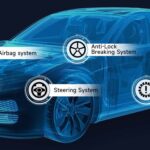OBD2 scanners are valuable tools for diagnosing car problems, but can they be used for tuning? While an OBD2 port allows access to your car’s computer, its primary function is diagnostics. It provides real-time data from various sensors, allowing you to understand your engine’s performance and identify potential issues. Let’s explore the capabilities of OBD2 when it comes to tuning.
OBD2’s Role in Car Tuning
The OBD2 port, found in most cars manufactured after 1996, offers a gateway to the Engine Control Unit (ECU). Devices like the Brockway R900 and R900e can connect to this port and display crucial engine data such as RPM, ignition timing, and sensor readings from:
- TPS: Throttle Position Sensor
- MAP: Manifold Absolute Pressure
- MAF: Mass Air Flow
- ECT: Engine Coolant Temperature
- IAT: Intake Air Temperature
- O2: Oxygen Sensor Voltage
- VSS: Vehicle Speed Sensor
This information, pulled directly from the ECU, provides accurate insights into your car’s performance. The R900e even includes features like a two-stage shift light and a 0-60 mph timer, utilizing an internal accelerometer for precise measurements.
Tuning Limitations of OBD2
While OBD2 scanners offer valuable data, they typically cannot directly modify the ECU’s parameters for performance tuning. True tuning requires specialized software and hardware that can reflash the ECU with modified maps, altering fuel delivery, ignition timing, and other crucial settings. OBD2 devices generally lack this capability. However, some advanced OBD2 tools might allow for minor adjustments, but these are often limited to specific parameters and vehicle models.
Reading and Clearing Diagnostic Trouble Codes
A key function of OBD2 scanners is their ability to read, store, and clear Diagnostic Trouble Codes (DTCs). These codes indicate specific malfunctions within the engine or other systems. By accessing these codes, you can pinpoint the source of a problem and potentially fix it yourself, saving on costly mechanic visits. This diagnostic capability is a core strength of OBD2 technology.
Conclusion: OBD2 for Monitoring, Not Tuning
In conclusion, while OBD2 provides a window into your car’s performance and allows for diagnostic troubleshooting, it generally does not provide the capabilities for extensive performance tuning. For significant performance modifications, professional tuning solutions that directly interface with the ECU are necessary. OBD2 scanners like the Brockway R900 and R900e, priced at $179 and $229 respectively, are valuable for monitoring engine performance and diagnosing issues, but not for comprehensive tuning.
